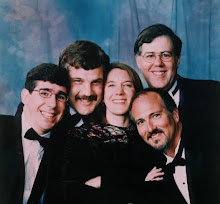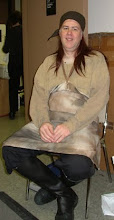I have to say that on the whole I found "Foreign Fire" to be more effective and engaging. Perhaps it was the monotonous repetition of murder after murder - which after all might be exactly the point. Part I - Henry VI, part 2 and part of part 3 - focusing on the Duke of York and his struggle with the gentle Henry VI and his aggressive queen Margaret of Anjou - was very effective and incredible well acted. Larry Yando as the power-hungry Duke of York and Karen Aldrich as Queen Margaret were especially effective. Margaret is one of Shakespeare's greatest creations, and perhaps his most fascinating and effective female character - even surpassing Lady Macbeth in my view. Steven Sutcliffe was also powerfully effective as the gentle Henry VI. To list the other standouts would require that I list the entire cast. The power grabs, the plotting, the cruelty and the murders were all carefully played out. And once the murder begins it cannot be stemmed. Particularly effective was the introduction of the peasant rebel Jack Cade. Historically Cade's rebellion emerged from the peasantry who were tired and suffering as a result of all the lethal fighting between the aristocracy. Cade, a populist and a demagogue takes advantage of the discontent and emerges as the leader who has his own interest in power. Shakespeare has him set up and encouraged by the Duke of York, as such he is a deluded and expendable fool. This production turns Cade into Donald Trump, complete with the cap, the hair, the orange skin and the mannerisms. It was effective and served to highlight the incredible danger an incompetent opportunist like Trump poses to the nation and the world. Just like Jack Cade, power and tyranny would be the order of the day were Trump to come into power. Kevin Gudahl was a terrific Jack Cade/DT - and he was a terrific Earl of Warwick as well. Part I ends with the end of Richard, Duke of York in a particularly grisly yet powerful scene Margaret plants a paper crown on his head and gives him a white handkerchief which has been dyed red in the blood of his youngest son, the child Edmund, Earl of Rutland. York's oldest son, Edward now takes his father's place, successfully claims the crown but foolishly contracts a marriage to the widow Elizabeth Woodville, insuring that the power struggles and bloodshed will continue.
Part II concludes the Henry cycle and moves us into a focus on Richard, Duke of Gloucester later to be Richard III. Now, I have had a long standing relationship with the play Richard III. Many years ago when I was in high school I saw the play performed in Boston with a young Al Pacino in the title role. I was mesmerized and captivated by the play and it became my senior thesis as I studied and compared the history of the play with actual history. I discovered that Shakespeare's Richard is not so historical and that the play really is Tudor propaganda. Richard is made a monster, he looks like a monster and acts like a monster. But he is a charming monster. By the end of the play we tire of him and are anxious to see him removed as good finally triumphs over evil. This is all historical nonsense of course. Henry Richmond was not the savior he is depicted to be in the play. Henry VII was a paranoid, insecure and brutal despot - not unlike any of the kings who came before - who ushers in the modern police state. During the performance on Wednesday I found myself keenly aware of the propaganda dimension of the play: Margaret's prophecy, the scene with the ghosts (mercifully with most of the Henry parts cut) and Henry's final speech. It was made worse by all of the cuts, which I understand were necessary, but the consequence was that there was little time for any character development. The other interesting characters - Buckingham and Hastings for example - had their parts cut so much that they hardly registered. Timothy Edward Kane was a terrific Richard, but I felt that this second part was not as effective as all that came before. The propaganda dimension of the play undercut the point of the overall work I think. Lifting up Henry as a savior as if he is some kind of superman who comes in to fight the forces of evil is simply nonsense. The evil depicted in all of the plays represented which is fed by power lust and violence cannot be stopped with yet more violence and Henry is just as bad as the rest. This is my major complaint. Richard III was not effective as a concluding play for this project. Admittedly there is really no other option since there are no other plays that continue the story. (Henry VIII is not a possibility - it is a completely different play).
But there were other things that I found distracting. Clarence was not drowned in a vat of Malsmsey wine - though he obviously had a drinking problem (I liked that actor quite a lot however - John Tufts is terrific). I did not like the way Hastings was depicted. Lord Hastings was Edward's best friend, drinking buddy and hunting partner. They were inseparable while Edward lived. It would be hard to imagine this Hastings, the petty administrative functionary, as such a close pal to Edward. These are minor complaints, so on the other hand, this presentation of the play with all its cuts did focus more attention on the women. With so much of the play's cuts taking away from the male characters, the women I think had their scenes retained almost in tact. The incredible parallel scenes where Richard woos first Anne and then Elizabeth (for her daughter) where the women eventually have no choice to succumb but only after giving vent to their rage and disgust were both particularly effective. The scene with the four women - Anne, Elizabeth, Margaret (who is like a phantom in Richard III) and Richard's mother the Duchess of York - who has come to loathe her son - was also exceptionally effective. In part I - "Foreign Fire" - the women were more or less pawns, here in "Civil Strife" they come into their own and exercise more strength and determination.
Ultimately I had mixed feelings about the ending. Thankfully the play did not end with the gag inducing nationalistic speech of Henry VII post-Bosworth. The appearance on stage of the cast as players and victims of all the violence and the disposal of the wall were effective. The final song seemed a bit simplistic to me. If only....
The experience was overall very profound and called needed and important attention to the issues of endless idiotic wars which are fought for fake reasons of "security" but really are fought only for profits and power as hundreds of thousands of victims are produced as a result. Look at the wars we have created and continue to prosecute and what do we have? Security? Stability? Democracy? Justice? Nope - the world is a more unsettled and insecure place as a result of the idiotic wars begun by GWB. The security of the world is more unstable than ever before by the emergence of harsher, more violent and more self-righteous groups. And the "collateral damage" has included an uncountable number of men, women and children who are now refugees. And in the end who benefits? In the end the crown is made of paper and the reward is a useless swinging tire that we have spray-painted gold. This was a powerful couple days spent in the theater.
The promotional clip for Tug of War: Civil Strife


